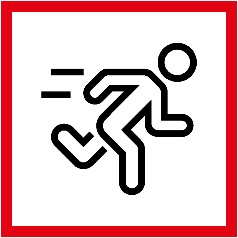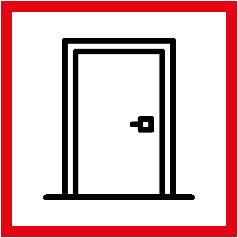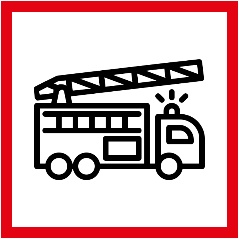Get Out Stay Out
Having a fire in your home is devastating.
Your home is where you keep your belongings, prized possessions and memories. It may be tempting to tackle a fire to try to save these items but doing so might be the last decision you ever make.
We are seeing a concerning number of injuries, and even deaths, caused by people who during a fire are either choosing to tackle it, are delaying leaving or are returning to the property to collect belongings and search for pets.
Leave tackling fires to the experts, our firefighters! Fire is very dangerous and just a few gulps of toxic smoke can be fatal. That is why our firefighters go through endless hours of training, wear breathing apparatus and have specialist equipment to safely tackle fires.
If you have a fire in your home, our advice is to get out, stay out and call 999 – never try to tackle it yourself or try to collect your valuables.
Possessions can be replaced, you can’t.
Our online fire safety tool will help you check how safe you are from fire. It will take you through your home one room at a time and the simple questions will help you spot fire risks as you go around your home.
For further advice visit our Safe and Well Service page.
Check your home and consider these questions
Smoke alarms provide an early warning of a fire and time to escape. Follow this advice:
- Make sure you have at least one smoke alarm on every level of your home.
- If you live in a rented property your landlord must ensure you have smoke alarms and make sure they are in working order at the start of a new tenancy. Speak to your landlord about smoke alarms in your home.
- Test your smoke alarms regularly.
For more information please visit our smoke alarms page.
You need to know how to get out of your home safely if there is a fire.
Follow these tips on how to make an escape plan:
- The best route is the normal way you come in and out of your home.
- Plan a second route in case the first one is blocked – consider windows.
- Take a few minutes to practise your escape plan regularly.
- Keep door and window keys in a safe place to ensure you can access them in an emergency.
You are more at risk from a fire when asleep. It is therefore a good idea to check your home before you head to bed. Use this quick checklist every night:
- Close internal doors at night to stop a fire from spreading.
- Turn off and unplug electrical appliances unless they are designed to be left on - like your fridge or freezer.
- Make sure mobile phones, tablets or e-cigarettes aren’t charging overnight.
- Check your cooker is turned off.
- Don't leave the washing machine, dishwasher or tumble dryer on overnight.
- Turn heaters off and put up fireguards.
- Put candles and cigarettes out properly.
- Make sure exits are kept clear.
- Take your mobile telephone to your bedroom and know your escape plan in case of a fire.
- If you have mobility issues, ensure mobility aids and methods of calling for help (like emergency pendants) are close to hand in case help is needed to assist with an escape.
If there is a fire in your home get out, stay out, call 999.
If your escape route is blocked:
- Close the door, and put bedding or any soft materials around the bottom of the door to block the smoke, then open the window and shout for help: 'HELP, FIRE'.
- If you have a phone with you, call 999 – be ready to describe where you are and the quickest way to reach you.
- If you’re on the ground or first floor, you may be able to escape through a window. Don't jump – use soft materials to cushion your fall, and lower yourself down carefully.
Contents insurance covers your belongings against loss, theft or damage. Your content insurance should cover any damage caused by fire, flooding, storms and thefts. The insurance covers the cost of replacing or repairing your possessions.
Building insurance covers the cost of repairing or rebuilding your home if the damage is severe.
Nowadays, our memories and photos are mainly stored on digital devices. It might be worth considering saving these photos to a Cloud storage device so that you can access your photos elsewhere, if your phone, computer or laptop gets broken or damaged. As you will always have access to them you won’t then need to worry about them in the event of a fire.



